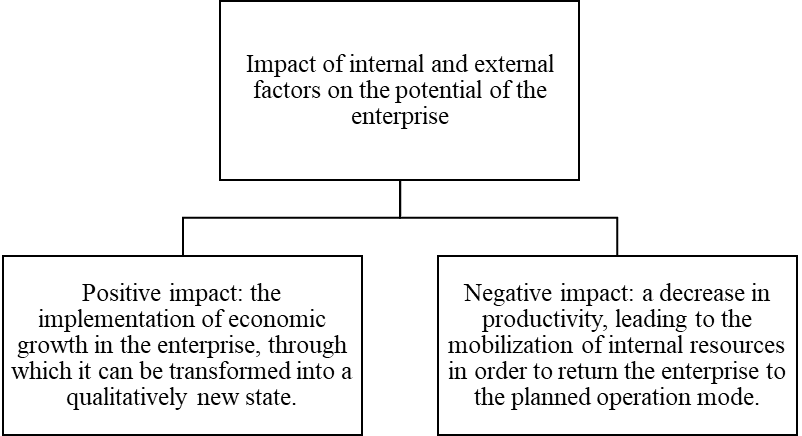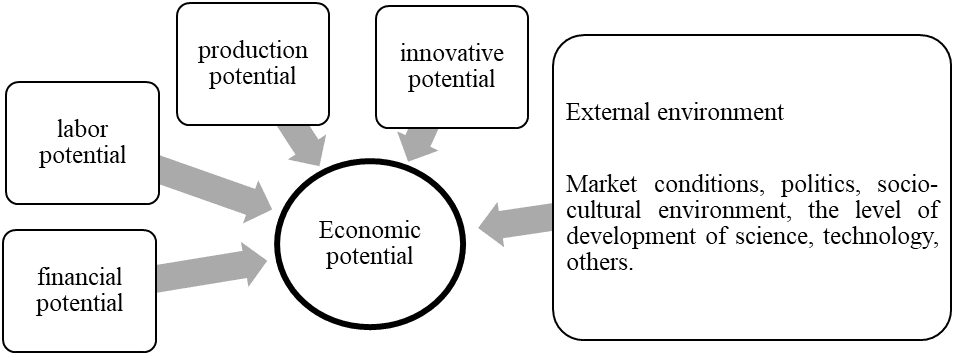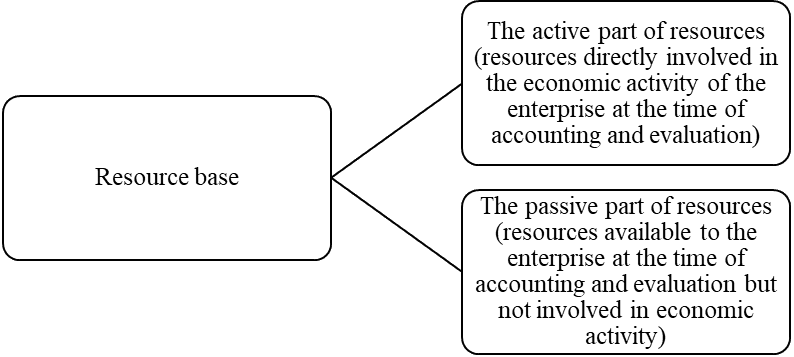Currently, the country’s economy is going through difficult times. It is significantly affected by the unstable exchange rate of the national currency, sanctions from partner countries, epidemics, and many other factors. In such difficult conditions of the country’s economy, the most important and priority direction of the strategy for further development for each enterprise should be identifying resource opportunities.
Theoretical understanding of the essence of resources as a basis for economic development, identification of their sources, development of ways, forms, and methods of their use allows formulating the principles of economic policy activation to intensify economic processes. In the context of increasing difficulties in the development of Kazakhstan’s economy, identifying resource opportunities should become a priority in the strategy of any business entity. The tendency of economic growth to depend on the potential situation is evident, which has always been noted by the developers of the theory of economic growth and confirmed by management experience.
In a broad sense, the potential is the means, reserves, and sources of an enterprise available or can be quickly mobilized to achieve a specific goal and solve any economic operation.
Today, there are many interpretations of the concept of “potential” in the economic literature, including a resource approach, an efficiency approach, and a target or strategic approach [2].
Thus, the economic potential of the enterprise is a multidimensional concept that combines the strategic goals and objectives of the enterprise, its driving forces, external and internal development opportunities, sources of development, and the results achieved.
In carrying out its activities, any enterprise interacts with the environment: external and internal factors. As a result of such interaction, further enterprise development is formed (figure 1).

Fig. 1. Impact of external and internal factors on the potential of the enterprise [3]
The characteristics that determine the economic potential of the enterprise include:
- external development conditions;
- internal prerequisites for development;
- belonging to a potential carrier (subject);
- use potential within the framework of achieving a specific goal, solving a particular problem;
- sources of capacity building;
- ability to identify and modify.
It can be said that the main problem of sustainable development of the enterprise is associated with the formation and full use of all the opportunities of its economic potential.
The efficiency of each enterprise is associated with the rational formation of the structure of the economic potential of the enterprise, so it is crucial to study all its elements.
Thus, the economic potential of the enterprise is formed from the various types of resources it owns. These resources are part of the economic potential. These include (figure 2):

Fig. 2. The composition of economic potential
Therefore, the economic potential of an enterprise is its ability to sustainable development, which is achieved by adapting internal and external factors of production to changes in the external environment, which, in turn, is achieved through the efficient use of enterprise resources and access to new technologies.
Economic potential is designed to help the enterprise to reach strategic management goals. In this regard, a special place in an enterprise’s management activities is given to the issues of its formation, development, and improvement issues.
Assessment of the enterprise’s economic potential is carried out using qualitative and quantitative methods: situational analysis, employee surveys, expert assessment, mathematical methods.
Often the content of the economic potential of the enterprise is revealed through summary characteristics: the actual capabilities of the enterprise, the number of resources and reserves, potential use, the results of potential use.
An assessment of the economic potential of an enterprise can be carried out using an integral indicator that includes all the factors affecting the enterprise. It should be noted that the entire composition of factors affecting economic potential is classified according to many criteria.
To determine the potential of an enterprise as an object of study of economics, essential to focus on theoretical approaches to determining the category of resource potential in the research of domestic and foreign economists. To date, there are many different definitions and interpretations of the concepts of “potential”, “resources”, “resource potential”. It is necessary to clarify the concept of potential.
Thus, an essential component of the economic potential of the enterprise is its resource component. All factors of production that are actually used or quickly mobilized in the production process are considered as resources.
The whole set of resources that make up the economic potential can be divided into two parts (fig. 3).

Fig. 3. The resource base of economic potential [6]
As methods of studying the economic potential of the enterprise are used:
Qualitative methods:
- office methods;
- employee survey;
- method of priority assessment of resources;
- graphical methods.
For instance, the Ishikawa diagram (“Fishbone”) can be used to determine the composition and relationship of factors that affect the economic potential of the enterprise and the relative importance of such factors [4].
Numerical methods:
- statistical;
- index;
- resource-regression method;
- integrated;
- indicative;
- economic and mathematical:
- method of monetary assessment of elements of economic potential;
- profitability;
- costs;
- analysis of economic activity;
- M. Porter’s value chain.
It should be noted that the above methods require considerable work for analysis and do not answer posed questions of managers about the effectiveness of using economic potential and its impact on the effectiveness of enterprise management. To conclude, it is noted that the effectiveness of the use of economic potential is assessed from two sides: the use of limited resources (resource efficiency), meeting the needs of society (target efficiency). Depending on the nature and reasons for the growth of target and resource efficiency, there are the following types of functioning of economic potential [5].
Intensive economic potential is determined by an increase in target efficiency due to the effective use of existing production factors.
Extensive economic potential - determined by the fact that the growth of targeted efficiency is carried out by attracting additional resources to production processes.
The economic potential management system is an integral component of the enterprise that allows it to achieve its goals, including increasing profits, improving its efficiency and financial stability.
Therefore, the assessment of the economic potential of the enterprise is an important element of the production management system, an effective tool for determining economic reserves, and the basis for developing forecasts of the company’s activities and management decisions.

.png&w=640&q=75)